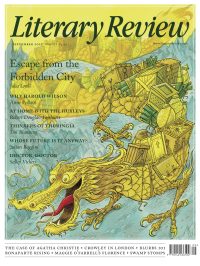Michael Cox
From Yorktown to Ukraine
The Four Ages of American Foreign Policy: Weak Power, Great Power, Superpower, Hyperpower
By Michael Mandelbaum
Oxford University Press 570pp £26.99
The main argument set out in this detailed, easy-going study is encapsulated in the subtitle. Michael Mandelbaum, a leading figure in the study of US diplomatic history, asserts that America started out ‘weak’ in the late 18th and early 19th centuries, became ‘great’ in the period between 1865 and 1945, went on to become a ‘superpower’ in the subsequent four decades, and achieved ‘hyperpower’ status after winning the Cold War.
There are many heroes here, including, interestingly, Thomas Jefferson, perhaps the greatest empire builder of all. But there are few real villains. Those wanting an exposé of the iniquities visited upon the world by the United States will have to look elsewhere.
What Mandelbaum does do well is tell a good story without too much theory (there is hardly an ism in sight). He also reminds us that, while Donald Trump may have thought he could make America great again by turning the country’s back on the world, the ascendancy of the United States was firmly located within the wider international system. As he shows, it all began in the late 18th century when France, in its struggle with the British Empire, made American independence possible. Indeed, without ‘French participation’ the Americans would never have won the crucial Battle of Yorktown in 1781. ‘London’s naval supremacy’ then allowed the United States to grow without let or hindrance: the Royal Navy prevented Continental powers from intervening in the New World, effectively giving the United States a free hand there. Europe later provided the country with masses of cheap labour and was crippled by the 20th century’s two world wars.
Given its size and geographical advantages, there is no doubt that even without global war in the 20th century, the United States would have become a worldwide power. Even so, without Germany, Japan and the Soviet Union overreaching themselves in their own bids for supremacy, the United States

Sign Up to our newsletter
Receive free articles, highlights from the archive, news, details of prizes, and much more.@Lit_Review
Follow Literary Review on Twitter
Twitter Feed
Russia’s recent efforts to destabilise the Baltic states have increased enthusiasm for the EU in these places. With Euroscepticism growing in countries like France and Germany, @owenmatth wonders whether Europe’s salvation will come from its periphery.
Owen Matthews - Sea of Troubles
Owen Matthews: Sea of Troubles - Baltic: The Future of Europe by Oliver Moody
literaryreview.co.uk
Many laptop workers will find Vincenzo Latronico’s PERFECTION sends shivers of uncomfortable recognition down their spine. I wrote about why for @Lit_Review
https://literaryreview.co.uk/hashtag-living
An insightful review by @DanielB89913888 of In Covid’s Wake (Macedo & Lee, @PrincetonUPress).
Paraphrasing: left-leaning authors critique the Covid response using right-wing arguments. A fascinating read.
via @Lit_Review